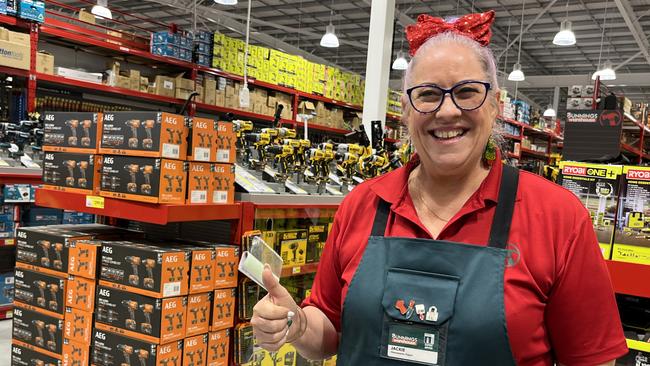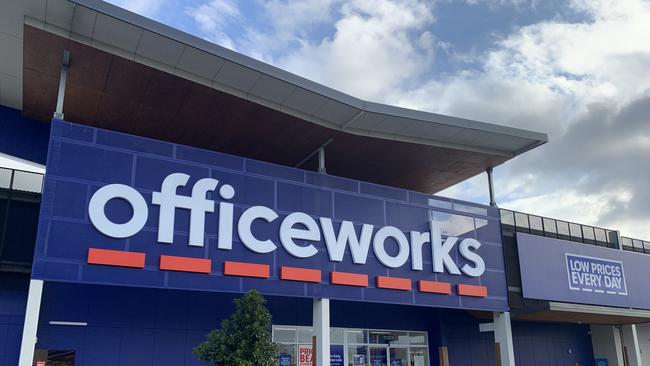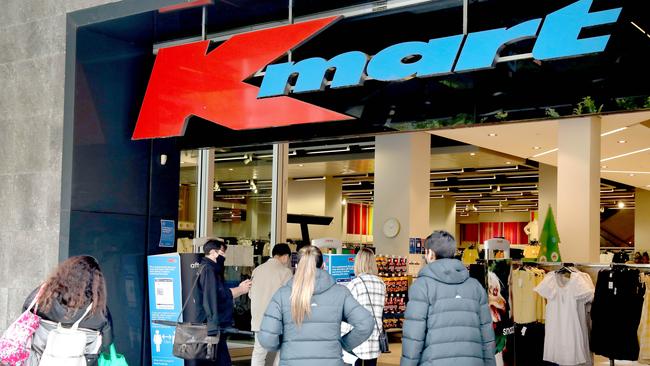Wesfarmers has flagged higher earnings at Kmart and Officeworks
The owner of Bunnings, Kmart and Officeworks modestly grew annual profit, but is seeing consumers trade down to value products.

Wesfarmers boss Rob Scott has cautioned federal and state governments against handicapping corporate Australia with burdensome red tape and an inflexible 1980s industrial relations framework just at a time when rising inflation and higher interest rates are placing a handbrake on parts of the economy.
Mr Scott, whose Perth-based conglomerate has a large multi-billion dollar portfolio of retail businesses that can rise and fall off the back of consumer spending and confidence, is increasingly seeing a shopper that is more “value conscious” and trading down to lower priced retailers and products to stretch household budgets.
This was starting to make its mark in Wesfarmers’ value-orientated chains, Kmart and Target, that had witnessed slowing sales in the second half and that had split into the first few weeks of fiscal 2024, while at its hardware giant Bunnings consumers were showing hesitation when it came to “big ticket purchases” and DIY projects that were more than a $1000 budget.
“So generally it has been a fairly pleasing start to the new financial year for our retail businesses, Target sales have come off a bit, which is not unexpected, and it is growing sales at a healthy rate albeit at a rate that we experience in the second half,” Mr Scott said.
“At Bunnings we are talking about the multi-thousand dollar renovation projects, and we are not surprised, when times get a bit tough and you see a bit of a slowdown there.”
Unveiling Wesfarmers full-year results, that beat market expectations with a 4.8 per cent rise in annual profit to $2.465bn, Mr Scott warned with elevated inflation and cost pressures in the economy this wasn’t the time to hamstrung business with red tape or wave in an industrial relations system that “essentially moved us back to a 1980s type framework that isn‘t set up for the future”.

This was especially critical for Wesfarmers as its portfolio of retail chains, Bunnings, Kmart, Target, Officeworks and Catch Group, competed with highly aggressive and cashed-up international competitors that in some instances could get a ‘free kick’ from not paying the same taxes as domestically based retailers.
“I think it would be a mistake to think about our competitors as just domestic retailers,” Mr Scott told The Weekend Australian. “It’s Costco, Amazon, it‘s Temu – the Chinese group – and we just need to be careful, we are not burdening Australian businesses and creating a disadvantage for Australian businesses relative to some quite formidable international competitors.”
On Friday Wesfarmers paraded the strength and advantages of its old fashioned conglomerate model as flat earnings growth at its traditionally most important profit driver, hardware retailer Bunnings, was bolstered by stronger returns from Kmart, Officeworks and its chemicals, energy and fertilisers division.
“I think it does (highlight the strength of the conglomerate model), the results highlight the quality of the portfolio and we benefit from having various platforms for growth. The performance of Kmart, officeworks, WesCEF all are a real highlight of the results this year but I wouldn’t underplay the strength of the Bunnings result … to be growing earnings off a really huge base delivered in recent years is a commendable effort,” Mr Scott said.
There was also the promise of future growth dividends from its burgeoning lithium assets dangled in front of investors, as construction was completed at its Mt Holland lithium mine and concentrator, with commissioning of the concentrator underway ahead of first expected earnings from the project in the first half of the 2024 calendar year.
Counter to that, a continued drag on Wesfarmers’ results was the poor performance again of its online retail business Catch Group – which it bought for $230m in 2019 – but where for 2023 its losses almost doubled for 2023 to $163m.
Total revenue for the year rose 18.2 per cent to $43.55bn, boosted by the inclusion of its new health division that contributed sales of $5.312bn, to become the conglomerate’s third biggest division by sales, and drawn from its recent takeover of Australian Pharmaceutical Industries.

The company declared a final dividend of $1.03 per share, up from $1, and payable on October 5. This brings total fully-franked ordinary dividends for the year to $1.91 per share, an increase of 6.1 per cent on the prior year.
Earnings for its hardware giant Bunnings lifted 1.2 per cent to $2.23bn (although earnings for the June half were up just 0.7 per cent), earnings at the Kmart Group, which includes Target, rose 52.3 per cent to $769m, its chemicals and fertilisers arm WesCEF saw earnings growth of 23.9 per cent to $669m and Wesfarmers Health posted earnings of $45 from a loss of $25m in 2022
Mr Scott highlighted the performance of Officeworks through the 2023 financial year — where sales rose 5.9 per cent to $3.357bn and earnings lifted 10.5 per cent to $200m — saying it had realised the benefits from productivity investments over recent years.
At Bunnings — which delivers around two thirds of the conglomerate’s earnings — revenue increased 4.4 per cent to $18.539bn for the year. Excluding net property contribution, earnings increased 1.9 per cent. Sales growth was recorded in both consumer and commercial customer segments and across all trading regions, despite the impact of prolonged wet weather on spring trading on the east coast during the first half. Bunnings’ total store sales growth was 2.1 per cent for the second half, with strong demand and activity from commercial customers partially offset by lower consumer sales.
Wesfarmers Chemicals, Energy and Fertilisers (WesCEF) delivered another strong operating performance and a record earnings result, supported by elevated global ammonia prices.

The group expects net capital expenditure of between $1.1bn and $1.4bn for the 2024 financial year, subject to net property investment and the timing of major expansion projects in WesCEF, and inclusive of approximately $350m of development capex and $20m of capitalised interest relating to the Covalent lithium project.
Mr Scott said for the first seven weeks of the 2024 financial year, sales growth for Kmart Group has continued to benefit from strong trading results in Kmart, but growth has moderated from the second half of the 2023 financial year.
But he noted the conglomerate’s businesses had already put down the hard work to prepare for the expected slow down of the economy and consumer demand, giving Wesfarmers a strong position for growth in 2024 despite the swirling economic headwinds.
“I feel that coming into this new financial year, our retail businesses are already very well positioned with a number of proactive changes. So one of the challenges is that as times get tougher you have to react, whereas I feel that we have been on the front foot with this.”
Examples of this were Bunnings recent redundancies in Australia and New Zealand to slim down its cost base, the merging of back offices for retail chains Target and Kmart and Officeworks boosting in-store productivity and stock availability.
“We are confident that the plans we currently have place will help us offset some of the cost headwinds that we are experiencing around high wage costs blowing through and some of the other cost of doing pressures that are out there.”
Shares in Wesfarmers rose $1.58 at $51.




To join the conversation, please log in. Don't have an account? Register
Join the conversation, you are commenting as Logout